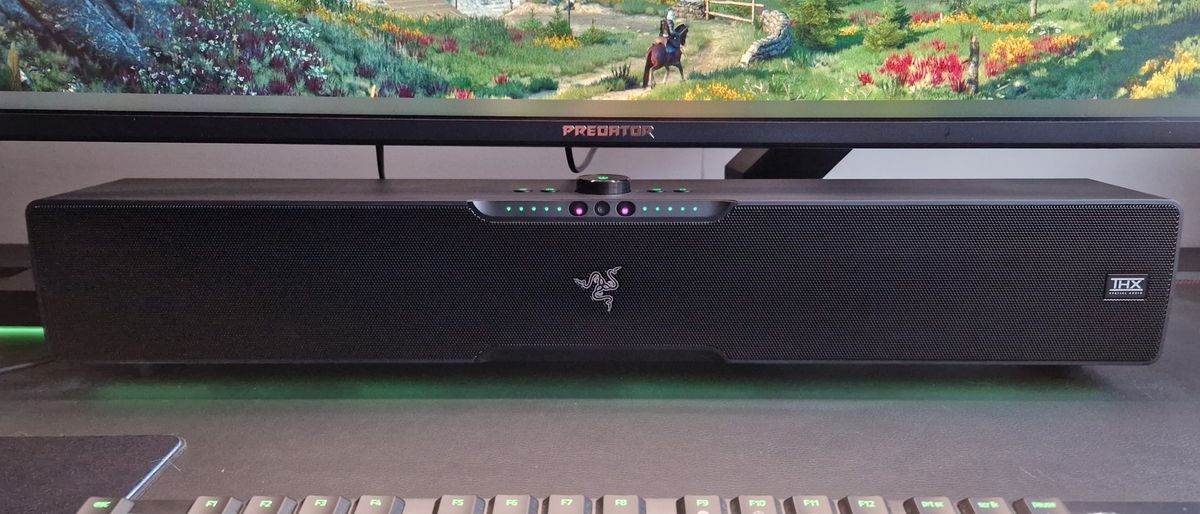12DOVE Verdict
The Razer Leviathan V2 Pro is both a premium-sounding soundbar and a bit of a confusing one. The sound quality is the best of the new range, and when it shines, its 3D soundstage and audio pedigree really come through. But the head tracking tech isn't quite as seamless as it needs to be and I found underlying noises that interrupt the experience, jarringly.
Pros
- +
Razer-quality gaming audio
- +
Plenty of power and volume
- +
Good 3D audio settings
Cons
- -
Head tracking is easily interrupted and adds audio delays
- -
Near-constant bubbling or processing noise appears and ruins that good audio
- -
A full 60% more expensive than the ordinary Leviathan V2
Why you can trust 12DOVE
Update: 19/6/23 - Following my original complaints earlier this year, Razer has sent me a second Leviathan V2 pro unit to investigate. While this won’t change the original review or score - we can only review fully what is before us and sent to us - this replacement model has addressed some of these original complaints.
When I first reviewed the Leviathan V2 Pro, I received one of the first units ever made and, by extension, one of the first units to be sent out to the media. This replacement unit is from the mass production run that you, the readers, would also be buying from.
In brief, I’m pleased to say that this unit seems more representative of the Razer level of quality we have come to know over the time we’ve been reviewing its products. After many hours of testing, I can report that there is no strange crackling, and there is no delay to the head-tracking, beamforming audio that I previously experienced - in fact, I can now say that it is instant and, well, excellent. Naturally, however, the concern about value is still present, despite this unit having no problems - I remain unsure whether the beamforming audio feature and slightly beefier drivers warrant the 60% extra on the price compared to the regular Leviathan V2 soundbar.
We don’t usually change review scores at 12DOVE, plus, as mentioned, the original review was still a fair assessment of the product sent to me and that I lived with for several weeks. However, our overall advice and opinion have altered somewhat by seeing a replacement unit, and we can safely recommend this as a good soundbar and computer speaker option.
The Razer Leviathan V2 pro completes the gaming hardware behemoth's refreshed lineup of the new Leviathan soundbar lineup - and it promises to offer something clever, unique, and truly different from competitors in the audio world. Adding a camera to a soundbar is something on its own, but Razer promises that this will mean that the bar can track your head and alter the audio no matter what position you take in order to give you the best experience with its beamforming surround sound. Curious indeed.
I thought the Leviathan V2 soundbar - now the middle model - was a decent revamp of the cult-favourite sound-giver that was initially released nearly a decade ago now. The original and the V2 now both sit on our best computer speakers and best gaming sound system pages - and for good reason.
So what does the V2 Pro offer, and is it worth the extra investment over its siblings. As Reverend Lovejoy put it: the short answer is 'yes', with an 'if'; and the long answer is a 'no', with a 'but'. Let's get into it.
Design & Features
Broadly speaking, the V2 Pro shares the same design language as the other models: cuboid, blocky, and rather unsubtle. The subwoofer is almost identical to the V2's but the soundbar is longer, wider, bigger, chonkier, and fatter in every way basically. This makes it a little more demanding of desk real estate but, all in all, it's still a pretty compact soundbar that can happily fit under any monitor.
The buttons to control the soundbar are all on top. There's a power button and volume dial, and four small circular buttons that cover EQ, 3D audio profile, input, and chroma functionalities. The camera and its sensors are flanked by two lines of LEDs that notify you of the camera processing and audio changing, but can also be used to indicate which settings you've chosen with the buttons on the top too - even though the on-screen notification is a far clearer and easier means through which to get that information.
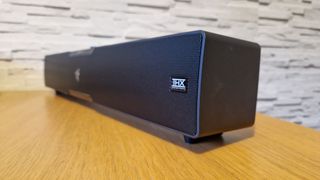
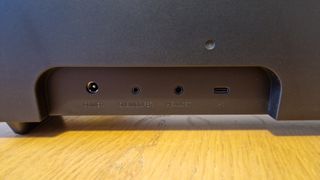
Small design niggle: because the camera needs to be front-facing and the buttons are therefore shunted to the top - and pushed back a bit - interacting with them can be tricky depending on your monitor's height and positioning. My ultrawide monitor comes dangerously close to the top of the buttons, for example, which makes it harder to freely use the controls. Though, having said that, I get around that by using the media controls on my keyboard anyway. But still, little ergonomics like that matter, especially when the price tag is as high as this.
Speakers: Soundbar: 5 x full-range drivers at 2" / 51mm; Subwoofer: 1 x 5.25" / 133mm
Dimensions: Soundbar: 23.6 x 4.5 x 3.5" / 600 x 113.7 x 90.1mm; Subwoofer: 10.2 x 11.6 x 10.2" / 260 x 295 x 260mm
Weight: Soundbar: 5lbs/2.27kg; Subwoofer: 11.19lbs/5.08kg
Connectivity: USB, Bluetooth 5.0, 3.5mm audio jack
Frequency response: 40Hz – 20kHz
Price: $399.99/£399.99
Tested on PC.
As is now commonplace across the Leviathan V2 series, Razer has deemed it appropriate to slime down the number of ports available to use - and thus connectivity options overall. Along with Bluetooth 5.0, there's a USB-C out and an audio jack. Once again then, this is a soundbar that is now geared firmly - exclusively - toward being used with a gaming PC or gaming laptop and not a games console or, well, anything else. At least there's an audio jack connection here so there's some reliable and trusty analog connection that the V2 and V2 X lack.
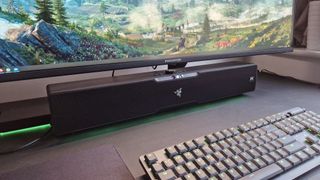
Performance
I'll start with the positives, and that is, broadly speaking, the audio you get from the Leviathan V2 Pro is great Razer-grade gaming and media audio.
And you can go about getting that audio in a number of ways, to tailor it how you want. You can alter the EQ as you see fit, creating custom profiles in Synapse, or plumping for the presets - as you can with other Razer speakers - and you can also cycle through the soundbars 3D audio profiles (or not-3D as the stereo one is, for example).
This can be where the Leviathan's audio shines its brightest too. The Virtual Headset mode does do a pretty good job of mimicking what Razer headsets and even the best gaming headsets can offer - and that's impressive from a soundbar. The Virtual Speakers profile also does a good job of giving roundness to all media which I've generally really enjoyed.
However. It wasn't and isn't all glorious. I have experienced an incessant bubbling or crackling, or processing noise throughout all of my time using the Leviathan V2 Pro. This has been bad enough so as to ruin audio moments both when listening to music and in quieter game moments. In the hope of isolating the problem to a setting, I have tried multiple different USB ports on my setup, all the different EQs and modes, and combinations of them both - but have still got the awful noise, regularly. This is, quite frankly, not the kind of thing you want from a $400 soundbar. Or from an audio product from the likes of Razer too. For what it's worth, it was always at its worse and most egregious in the 'flagship', Virtual Speakers mode. Maybe this can be patched or 'firmwared' out, but as it stands, it really does impact the performance and experience greatly.
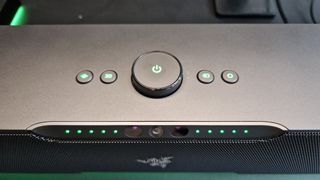
I've also found the head tracking feature to be a little disappointing, distracting, and, honestly, a bit gimmicky. Well, at first, it does seems clever, and listening out for how it changes the audio is fun. In practice it's another matter, as with every movement or change, the soundbar then has to work out and adjust to the changes. And this is not immediate. By any means.
The sound changes but it takes somewhere between a second and a few seconds - so there's a delay and it jars. Hard. This delay is tolerable in single-player games like a Red Dead 2 and certainly nothing to worry about in something like a Total War: Troy. But it immediately gets more annoying in anything busier - even in Dawn of War 3 firefights for example. Obviously, the thing is: it shouldn't be to the 'credit' of a $400 soundbar that its headline feature is 'tolerable' (even in those less demanding games). And, naturally, you can't disable it, because it's the flagship feature of the bar...and if you could then it'd be incredibly like Any Other Soundbar so would rather defeat the purpose. The camera that brings about the sound alterations also, naturally, requires a clear of you, so if you have desk furniture or merch then it'll require careful placement, and if you share your workspace with a cat/s then it'll constantly change every time they take a stroll in front of it.
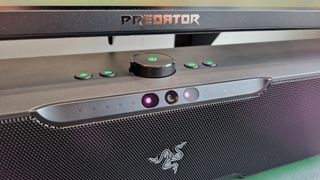
Away from games, if I'm just listening to music and working then it's downright annoying. For example, right now, as I type this out, I am learning slightly forward toward my screen, barely moving, and the soundbar keeps changing the audio of the music I'm listening to and it feels very, very weird. And I'm really not sure how this can be better than any other soundbar I've tested.
I will say, however, that the V2 Pro does iron out a slight annoyance I had with it's middle-brother: with the V2, it was very hard to balance the bass levels between the bar and woofer while using a standing desk rather than a stationary gaming desk; it was just really hard to find a 'set and forget' setting. I'm pleased to say that this has not been a problem with the V2 Pro. The bass is great and there's plenty of it too; generally the amount of volume and power in the V2 Pro is excellent and worth noting too.
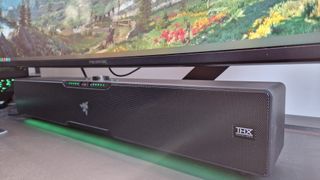
Should you buy the Razer Leviathan V2 Pro?
When you get it right or get a 'clean listen' the quality of the audio saves the Leviathan V2 Pros graces rather and, if it were just giving me that, consistently, I might have looked on it more fondly. Because when the sound alone does punch through, uninterrupted, it does make for a very rounded, fulsome, excellent audio experience.
So to go back to Reverend Lovejoy's framing. Yes, the Leviathan V2 Pro does do a lot to justify its higher price tag if it were possible to isolate and concentrate on that great Razer audio quality on its own. But, also, no, the V2 Pro isn't worth the extra investment over the V2, but if my niggles and annoyances can be ironed out and the head tracking can become more instant, then it could be a great, clever soundbar solution.
Until the latter does - if indeed it can be - get fixed, though, the Razer Leviathan V2 Pro has the making of a smart and quality soundbar but is let down by some pretty bad flaws and is quite hard to recommend as a result. Throw in that sizeable 60% price difference between the simpler, yet very solid Leviathan V2 and the V2 Pro is hard to recommend even when looking at its own line of models. (Heck, even the awesome stereo gaming speakers, the Q Acoustics M20 HDs are less than the Leviathan V2 Pro in the UK!)
And I suppose there's a chance my unit could have been a dodgy one, but we can only review what's in front of us and what's sent to us.
Given the head tracking weirdness particularly, the Leviathan V2 Pro feels less like a quality soundbar option for PC gamers, and more like an overcomplicated one that just doesn't sit well. I'd still much rather have something simpler that concentrates on good-quality audio - which is why I'm going back to my Yamaha SR-C20A straight away.
How we tested the Razer Leviathan V2
The Leviathan V2 Pro lived on my desk for about two weeks and was used almost every day for work and play - hours at a time, sometimes all day. I used in for meetings as well as listening to music and podcasts while I worked.
Where possible, it totally replaced my headset, and I was also able to A-B test it against the Yamaha soundbar I was using before. In addition to the aforementioned work, and daily use, I tested the V2 Pro with games like The Witcher 1 (I know), Red Dead Redemption 2, Apex Legends, Total War: Troy, Red Alert Remastered, and also remote playing my PS5 on my PC too.
You can read more about our hardware approach to all kinds of gear that we get our hands on in our full 12DOVE Hardware Policy.
Tested on PC with a Razer Blade 15 laptop supplied by Razer and with an Acer Predator X38 monitor from Acer.
If you're looking for a lovely new screen to place the Leviathan V2 Pro under then check out our best gaming monitor, best ultrawide monitor, and best curved gaming monitor guides.
Rob is the Deputy Editor of sister site, TechRadar Gaming, and has been in the games and tech industry for years. Prior to a recent stint as Gaming Editor at WePC, Rob was the Commissioning Editor for Hardware at 12DOVE, and was on the hardware team for more than four years, since its inception in late 2018. He is also a writer on games and has had work published over the last six years or so at the likes of Eurogamer, RPS, PCGN, and more. He is also a qualified landscape and garden designer, so does that in his spare time, while he is also an expert on the virtual landscapes and environments of games and loves to write about them too, including in an upcoming book on the topic!

"Joel was right": The Last of Us director Neil Druckmann defends his character's decision at the end of the first game

Ghost of Yotei will let you cut loose with dual katanas, ōdachi, and more new weapons when it launches this year, PlayStation confirms

Heat director Michael Mann says the first draft of his sequel script is finished and handed in to Warner Bros.
